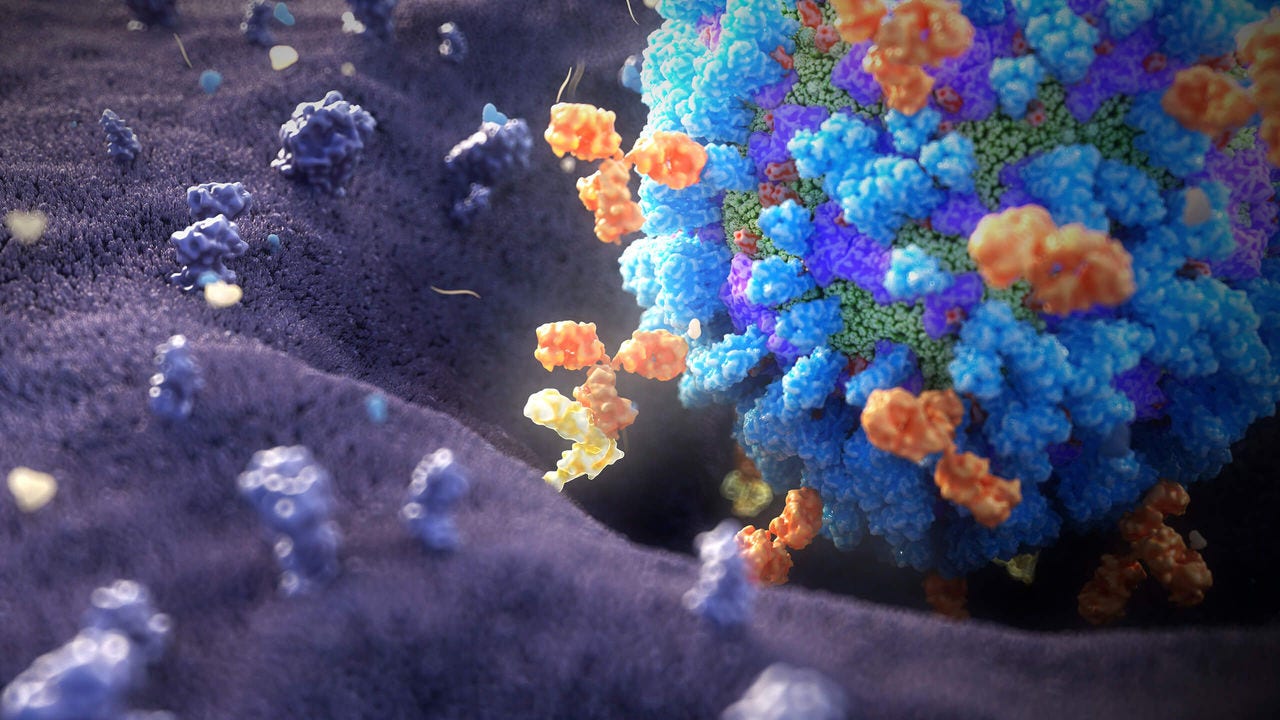Protein-based platforms
Protein-based therapeutics have become a backbone approach in modern medicine due to the fundamental role of proteins in all biological processes and the technological advances in synthetic protein production. A key pillar of our protein-based platforms are antibody therapeutics based on our in-house oncology expertise. Driven by the focus of fostering innovation, we have constantly diversified and expanded our capabilities and candidate pipeline with novel formats and technologies, including antibody-drug conjugate (ADC) therapeutics and synthetic lysins, as well as further broadened the scope of our therapeutic development areas in the infectious disease field. Based on our platforms, we aim to expand the application of protein-based therapeutics to broader patient populations and novel indications.
Next-generation checkpoint immunomodulators
Multi-specific antibodies that can simultaneously bind different targets on cancer and immune cells are a powerful new therapeutic option for the treatment of solid tumors. With our next-generation checkpoint immunomodulators platform, we can create novel bispecific antibodies that are designed to activate immune cells via two simultaneous routes:
- one arm of the antibody binds and thereby blocks target structures (such as CD40 or PD-L1) on the surface of immune cells that are used by cancer cells to silence the immune cells, and
- the other arm binds to an activating receptor (such as 4-1BB) on the surface of immune cells, triggering stimulation of their functions.
By blocking the “off-switch” on immune cells that cancer cells use to silence the immune system and simultaneously activating immune cell functions, we aim to circumvent or even reverse the immune evasion induced by tumor cells, a key tactic particularly for fighting advanced-stage and resistant cancers.
At a glance: Our next-generation checkpoint immunomodulators platform
Concept: Bispecific antibodies enhancing immune cell function to promote an anti-cancer immune response
Mechanism: Upon simultaneous binding, our bispecific antibodies stimulate immune cell function (via binding to 4-1BB) and block inhibitory signals (via binding to CD40 or PD-L1)
Therapeutic areas: Solid tumors, including non-small cell lung cancer
Targeted cancer antibody discovery engine
Our targeted cancer antibody platform uses sophisticated discovery engines to identify novel cancer antibodies with excellent specificity and binding affinity for unique tumor targets as well as reduced risk for unwanted immune reactions. The target structures on the tumor surface can either be proteins or tumor-associated carbohydrate antigens (TACAs), another promising target for the development of therapeutic antibodies. This proprietary antibody platform is also used for the identification of alternative antibody formats. With the use of the antibody discovery platform, tumor- and immune cell specific binders are thus made available across our drug classes.

At a glance: Our targeted cancer antibody discovery engine
Concept: Antibodies targeting novel, highly specific cancer antigens involved in tumor and metastasis formation
Mechanism: Monoclonal antibodies binding to cancer-specific antigens flagging tumor cells for destruction by immune cells
Therapeutic areas: Solid tumors, including pancreatic cancer
Antibody-drug conjugate platform
Antibody-drug conjugates (ADCs) are a class of precision cancer therapies that combine tumor-specific antibodies, one of the body's own defense mechanisms, with the cell-killing features of an anti-cancer chemotherapy ("payload"). With this approach, we aim to harness new highly effective anti-cancer agents, which previously could not be administered alone due to their high off-target effects on healthy tissue, by targeted delivery to the cancer cells.
Based on our collaborator’s technological know-how, we aim to design highly stable antibody-payload therapeutic candidates with improved delivery properties. The ADC technology platform also allows us to combine previously incompatible antibody-payload combinations based on a series of linker-payload libraries. We believe, these novel antibody-payload combinations have the potential to provide new treatment options for a range of solid tumor indications and, if approved, may offer an alternative to traditional chemotherapy.
At a glance: Antibody-drug conjugate platform
Concept: Combination of tumor-specific antibodies and anticancer chemotherapies (“payloads”) for precise and effective destruction of cancer cells
Mechanism: Upon targeted binding of the antibody to the tumor cell, the anti-cancer agent, which can have various modes of action, can induce cell death of the cancer cell.
Therapeutic areas: Solid tumors, including non-small cell lung cancer
Next-generation synthetic lysins
Antibiotic resistance is one of modern medicines’ biggest challenges. Lysins are antibacterial proteins that degrade the bacterial cell wall and that are specific to individual types of bacteria.
In nature, lysins are typically produced by bacteriophages, viruses which specifically infect bacteria for replication. Bacteriophages utilize lysins to break open the bacterial cell wall in the final part of their replication cycle to further spread their viral copies. Synthetic biology enables the design of optimized lysins that build on nature’s evolution but have strongly improved pharmaceutical properties.
BioNTech’s LysinBuilder™ platform enables the engineering of synthetic lysins. Laboratory studies have shown high efficacy and stability of our investigational synthetic lysin candidates against specific types of bacteria. We believe that the technology has the potential to become a new class of precision antibacterials that could be effective where established antibiotics have failed and could thereby enable new treatment paradigms while preserving the natural microbiome of the body.
At a glance: Our next-generation synthetic lysins
Concept: Cell-wall degrading enzymes that target and eliminate individual types of bacteria
Mechanism: Lysins degrade the peptidoglycan of the bacterial cell wall thereby killing the bacteria
Therapeutic area: Drug-resistant, persistent infections, including bacterial vaginosis
Explore more

Pipeline

Publications
